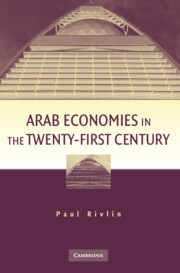12 - Tunisia
Unhappy Economic Leader
Published online by Cambridge University Press: 05 June 2012
Summary
In comparison with most Arab states, Tunisia is a small country both geographically and demographically. Its population is relatively homogenous, both ethnically and linguistically, and the distribution of income is one of the most equal in the region. Tunisia has the highest level of income per capita among the non-oil states. In 2005 it was $2,890, 29 percent higher than the Middle East and North Africa average, including the oil states of the region. The number of people living in poverty (defined as living below a minimum consumption expenditure level) fell from 800,000 (8 percent) in 1995 to 400,000 (4 percent) in 2000. The economically vulnerable (defined using a more generous definition) fell from 17 percent of the population to 10 percent.
Tunisia has suffered little political instability in recent years, partly the result of vigorous and successful attempts by the government to root out opposition. The government has followed a liberal economic policy that has reduced budget deficits, cut inflation, and opened the economy to foreign trade. Tunisia also has very close links with the European Union (EU), which dominates its exports and imports. It has a relatively large industrial sector and has very limited oil and gas resources. Perhaps because of that it has had to invest in other, more labor-intensive activities with the result that living standards are relatively high. For many years, the Tunisian model was one that other Arab states could follow to advantage, but today problems are apparent.
- Type
- Chapter
- Information
- Arab Economies in the Twenty-First Century , pp. 266 - 286Publisher: Cambridge University PressPrint publication year: 2009



